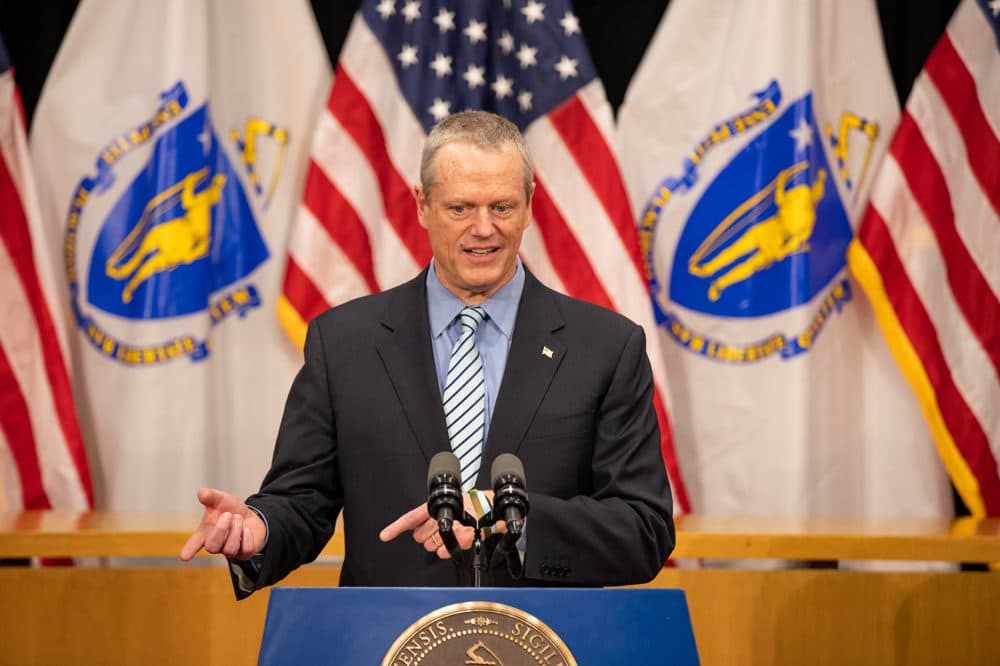Advertisement
Baker Signs New Order Extending Mass. School Closure Through End Of April

All schools and non-emergency child care centers in Massachusetts will remain closed through the end of April, reopening "no sooner than May 4," Gov. Charlie Baker announced Wednesday during a daily briefing about the state's response to the coronavirus outbreak.
The new measure extends the state's earlier three-week school closure.
Baker said the state will help develop educational programming that students can use at home, including those with special needs and English language learners. Part of that programming will come via a new partnership Baker announced with public media outlet WGBH, which will offer daily educational TV programming between noon and 5 p.m.
"We recognize this is a traumatic time for our kids. We want to get them settled, and then we want to get them in a routine," said Elementary and Secondary Education Commissioner Jeff Riley, who also spoke at the press conference Wednesday. The extension "further allows us to keep our kids safe, while building in additional planning time needed for a longer-term closure."
State guidance will be sent to school districts Thursday. The goal is to "harmonize" with districts' respective remote learning efforts that are already underway, Riley said, as well as help define what students' new routine will look like.
Massachusetts Teachers Association President Merrie Najimy supports the state's move, she wrote in a statement.
"As always, our primary concern remains the well-being of students, educators and our communities," Najimy said. "We will continue to do everything we can to ensure that the state makes a significant and consistent impact in stemming the spread of the coronavirus and working for the common good of everyone in Massachusetts."
Staff at most schools have been working to get computers, internet access and food to students since closing over the last two weeks.
"I believe that the governor and the administration are making decisions with everyone's health and safety at the forefront," said Sharon Liszanckie, executive director of Boston Preparatory Charter Public School. "This is how schools contribute to that and it’s a way for them to keep individuals in schools — our students, our teachers, our families — safe."
Advertisement
A letter will be sent to families asking questions about access to resources and educational materials, especially among those households that lack internet access and other technological tools, Riley said. Learning materials in some districts already include pencil-and-paper work and hardcopy packets.
"We think that districts should use whatever they have at their availability to get out to kids. But we want to make sure we don't penalize any children that don't have access to the internet," Riley said.
The new need for socially distanced education presents a unique opportunity for "project-based learning" — like reading, cooking recipes or starting a garden — which could shed new light on how students learn best, he said.
Equity is on the forefront of school leaders minds. Some districts have been doing one-to-one learning well before the pandemic. But many are scrambling to assess and meet students' and teachers' technological, physical and mental health needs, while also delivering educational materials from afar.
"There's going to be a tremendous learning gap, that I'm not sure how you ever resolve," Framingham Superintendent Bob Tremblay told WBUR last week as he was preparing for the potential of a lengthy school closure. He worried that inequities between more affluent school districts and those with higher needs and fewer resources will deepen.
"For the child that requires reading support five times a week for 45 minutes each day, in addition to math support, and who requires speech and language pathology from a specialist, how does that get factored in?" Tremblay asked about remote learning plans. "Do we just leave those kids behind because they're not part of the majority of kids who actually do have the access? That inequity is going to be hugely problematic."
The state provided updated guidance for special education students and remote learning Thursday.
This article was originally published on March 25, 2020.
This segment aired on March 26, 2020.


